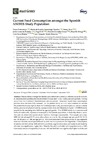Identificador persistente para citar o vincular este elemento:
https://accedacris.ulpgc.es/handle/10553/70093
| Título: | Current food consumption amongst the spanish anibes study population | Autores/as: | Partearroyo, Teresa Samaniego-Vaesken, María de Lourdes Ruiz, Emma Aranceta Bartrina, Javier Gil, Ángel González-Gross, Marcela Ortega, Rosa M. Serra-Majem, Luis Varela-Moreiras, Gregorio |
Clasificación UNESCO: | 3206 Ciencias de la nutrición | Palabras clave: | Anibes Study Consumption Dietary Pattern Food Group Food Subgroup, et al. |
Fecha de publicación: | 2019 | Publicación seriada: | Nutrients | Resumen: | Dietary habits amongst the Spanish population are currently a relevant cause for concern, as macronutrient profiles and micronutrient intakes seem to be inadequate and globally moving away from the traditional Mediterranean dietary pattern. However, recent food consumption patterns have not been fully assessed. In the present study, our aim was therefore to describe the current food consumption from the “anthropometric data, macronutrients and micronutrients intake, practice of physical activity, socioeconomic data and lifestyles in Spain” (ANIBES) study population by assessing data defined by age and gender. The ANIBES study is a cross-sectional study of a nationally representative sample of the Spanish population. A three-day dietary record was used to obtain information about food and beverage consumption. The sample comprised 2009 individuals aged 9–75 years, plus a boost sample for the youngest age groups (9–12, 13–17, and 18–24 years, n = 200 per age group). The most consumed food group across all age segments were non-alcoholic beverages followed by milk and dairy products and vegetables. Consumption of cereals and derivatives, milk and dairy products, sugars and sweets, and ready-to-eat meals by children was significantly higher than those by the adult and older adult populations (p ≤ 0.05). Conversely, intakes of vegetables, fruits, and fish and shellfish were significantly higher in adults and older adults (p ≤ 0.05). In order to comply with recommendations, adherence to the Mediterranean dietary patterns should be strengthened, especially amongst younger population groups. Therefore, substantial nutritional interventions may be targeted to improve the Spanish population’s dietary patterns nowadays. | URI: | https://accedacris.ulpgc.es/handle/10553/70093 | ISSN: | 2072-6643 | DOI: | 10.3390/nu11112663 | Fuente: | Nutrients, [ISSN 2072-6643], v. 11 (11), (Noviembre 2019) |
| Colección: | Artículos |
Citas SCOPUSTM
71
actualizado el 30-mar-2025
Citas de WEB OF SCIENCETM
Citations
66
actualizado el 30-mar-2025
Visitas
87
actualizado el 02-mar-2024
Descargas
91
actualizado el 02-mar-2024
Google ScholarTM
Verifica
Altmetric
Comparte
Exporta metadatos
Los elementos en ULPGC accedaCRIS están protegidos por derechos de autor con todos los derechos reservados, a menos que se indique lo contrario.
